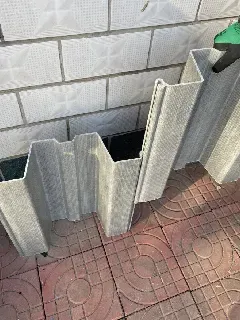loading...
- No. 9, Xingyuan South Street, Dongwaihuan Road, Zaoqiang County, Hengshui, Hebei, China
- admin@zjcomposites.com
- +86 15097380338
- Welcome to visit our website!
Innovative FRP Louvers Designed for Enhanced Cooling Tower Efficiency and Performance
FRP Louvers for Cooling Towers An Essential Component for Efficient Cooling
Cooling towers are vital components in many industrial processes, including power generation, chemical manufacturing, and HVAC systems. Their primary role is to dissipate excess heat by transferring it to the atmosphere, which is essential for maintaining optimal operating conditions in machinery and processes. One of the essential features that enhance the efficiency of cooling towers is the design and material of the louvers. This article explores the benefits of fiberglass reinforced plastic (FRP) louvers for cooling towers, emphasizing their importance in ensuring optimal performance and durability.
Understanding FRP Louvers
Fiberglass reinforced plastic (FRP) is a composite material consisting of a polymer matrix reinforced with fiberglass. This combination creates a lightweight yet incredibly strong product capable of withstanding harsh environmental conditions. In cooling towers, FRP louvers are used to direct airflow, maximizing the effectiveness of heat exchange. Their design also facilitates the uniform distribution of air throughout the cooling tower, enhancing the overall performance.
Advantages of FRP Louvers
1. Corrosion Resistance One of the most significant challenges faced by cooling towers is corrosion, primarily due to exposure to water and chemicals. Traditional materials such as metal are prone to rust and degradation over time, leading to increased maintenance costs and reduced efficiency. In contrast, FRP louvers are highly resistant to corrosion, making them ideal for use in cooling towers, especially in environments where chemical exposure is a concern.
2. Durability and Longevity FRP materials are known for their durability. The intrinsic properties of fiberglass allow FRP louvers to withstand extreme weather conditions, UV radiation, and thermal fluctuations without deforming or losing functionality. This longevity translates to lower replacement costs and reduced downtime for maintenance, providing significant economic benefits over time.
frp louvers for cooling tower

3. Lightweight Construction The lightweight nature of FRP louvers simplifies installation and reduces structural load. This feature is particularly important in retrofitting existing cooling towers where additional support structures may be required for heavier materials. Additionally, the ease of handling during installation contributes to faster project completion times.
4. Customizability FRP can be molded into various shapes and sizes, allowing for the design of louvers that meet specific operational requirements. Whether the need is for increased airflow, specific angles of deflection, or unique aesthetic preferences, FRP louvers can be customized to suit the particular needs of any cooling tower installation.
5. Cost-Effectiveness While the initial investment in FRP louvers may be higher than traditional materials, their long lifespan, reduced maintenance costs, and increased efficiency often result in significant long-term savings. The resilience of FRP also minimizes the need for frequent replacements and repairs, making it a cost-effective choice for cooling tower operators.
Environmental Considerations
As industries become increasingly conscious of their environmental impacts, the choice of materials used in cooling towers plays a critical role. FRP is often considered a more sustainable option due to its energy-efficient manufacturing process and extended lifespan, which reduces the overall material consumption over time. Additionally, many manufacturers are now producing FRP louvers using eco-friendly resins, further enhancing their appeal in environmentally sensitive applications.
Conclusion
FRP louvers represent a critical innovation in the design and functionality of cooling towers. Their robust performance, combined with the advantages of corrosion resistance, durability, lightweight construction, and customizability, positions them as the material of choice for modern cooling systems. As industries continue to seek more efficient and sustainable solutions, FRP louvers will undoubtedly play a pivotal role in the evolution of cooling tower technology. By investing in these advanced materials, organizations can ensure more efficient operations, reduced costs, and a reduced environmental footprint, paving the way for a more sustainable future.
-
The Rise of FRP Profiles: Strong, Lightweight, and Built to LastNewsJul.14,2025
-
SMC Panel Tanks: A Modern Water Storage Solution for All EnvironmentsNewsJul.14,2025
-
GRP Grating: A Modern Solution for Safe and Durable Access SystemsNewsJul.14,2025
-
Galvanized Steel Water Tanks: Durable, Reliable, and Ready for UseNewsJul.14,2025
-
FRP Mini Mesh Grating: The Safer, Smarter Flooring SolutionNewsJul.14,2025
-
Exploring FRP Vessels: Durable Solutions for Modern Fluid HandlingNewsJul.14,2025
-
GRP Structures: The Future of Lightweight, High-Performance EngineeringNewsJun.20,2025
